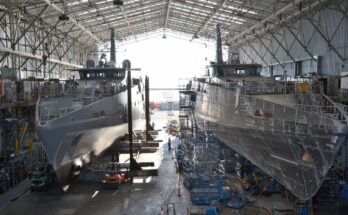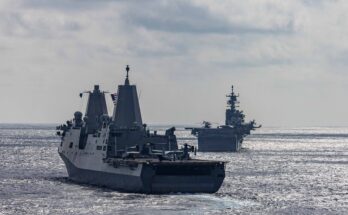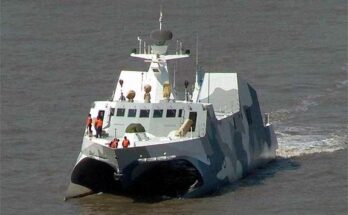Russia is continuing to test the Admiral Gorshkov frigate, the lead vessel of Project 22350, ahead of commission slated for later in the year. Speaking on April 20, 2017, Russian Deputy Prime Minister Dmitry Rogozin said the tests are proceeding on schedule.
Tass News Agency quoted the Deputy Prime Minister as saying, “The works are not being delayed and are proceeding according to plan. Our plan is due to be completed in July this year. Now the trials of all the assemblies are underway, including air defense systems deployed on this ship. These are Poliment-Redut complexes.”
Deputy Prime Minister Rogozin added, “Problems arise as to how to arrange the trials so that the test of one system does not impede the test of another complex.”
Admiral Gorshkov‘s entrance to service has been delayed, seemingly over issues with the Redut air-defense system. Last month, Deputy Defense Minister Yuri Borisov confirmed that development of the Redut system was the source of the delays, without further specifying.
It is believed that the issue stems from the system’s long-range missiles. While tests of the short- and medium-range missiles appear to be successful, the long-range missile is reported to fail shortly after launch.
However, trials are currently proceeding under Deputy Prime Minister Rogozin’s personal control, according to Tass, and Russia anticipates the vessel’s trials to be completed by July. The ship should be commissioned at some point thereafter, before the end of the year.
The second vessel in the class, Admiral Kasatonov, is currently planned to enter service in 2017 or 2018, but 2018 is probably the earliest date. Beyond the first two frigates, two more are under construction. Eight total ships are planned. All of the ships in the class after Admiral Kasatonov will have to feature a Russian-made gas turbine engine, following the collapse of military cooperation between Ukraine, the initial supplier of the class’ engines, and Russia.
The Russian Defense Ministry currently aims to deliver a Russian-made alternative to the Ukrainian gas turbine engines for the Project 22350 frigates in 2018. The pace of development of the Russian alternative will impact the speed at which more frigates in the class can be commissioned.
United Shipbuilding Corporation’s Acting Director General suggested last month that Admiral Golovko, the third vessel, would be transferred in 2019. The vessel is currently slated to be floated out in the third quarter of 2017.
Russia expects to receive six frigates from this class in total by 2025.
UPDATE: This post was updated to note that by 2025 Russia expects to have received six Project 22350 frigates.
Military markets analyst, covering Eurasia, Middle East, and Africa.




